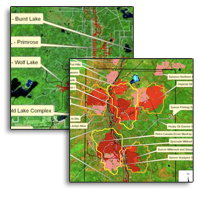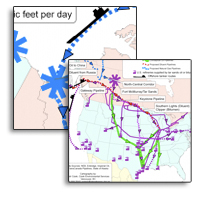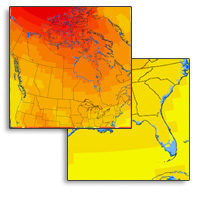Tar Sands 101
The Tar Sands "Gigaproject" is the largest industrial project in human history and likely also the most destructive. The tar sands mining procedure releases at least three times the CO2 emissions as regular oil production and is slated to become the single largest industrial contributor in North America to Climate Change.
The tar sands are already slated to be the cause of up to the second fastest rate of deforestation on the planet behind the Amazon Rainforest Basin. Currently approved projects will see 3 million barrels of tar sands mock crude produced daily by 2018; for each barrel of oil up to as high as five barrels of water are used.
Human health in many communities has seriously taken a turn for the worse with many causes alleged to be from tar sands production. Tar sands production has led to many serious social issues throughout Alberta, from housing crises to the vast expansion of temporary foreign worker programs that racialize and exploit so-called non-citizens. Infrastructure from pipelines to refineries to super tanker oil traffic on the seas crosses the continent in all directions to allthree major oceans and the Gulf of Mexico.
The mock oil produced primarily is consumed in the United States and helps to subsidize continued wars of aggression against other oil producing nations such as Iraq, Venezuela and Iran.
To understand the tar sands in more depth, continue to our Tar Sands 101 reading list
Freighter damaged along proposed B.C. shipping lane
Freighter damaged along proposed B.C. shipping lane
Ship sufferes severe damage, raising questions about safety of oil and gas supertanker taking route
Mark HumeVancouver— From Friday's Globe and Mail
Last updated on Friday, Oct. 02, 2009 02:48AM EDT
Questions are being raised about the safety of a proposed shipping channel for oil and gas supertankers on British Columbia's central coast after a freighter struck rocks near Kitimat.
Oil exports to U.S. set record
Oil exports to U.S. set record
Oilsands output helps fill shortfall from Venezuela, Mexico
By Lisa Schmidt, Calgary Herald
September 30, 2009
Canada --already the largest oil supplier to the U.S.--pumped out record exports south of the border this summer, as Alberta's oilsands crude fill the gaps left by competitors.
U.S. imports of crude oil from Canada rose 5.4 per cent in July to the highest monthly level in at least 36 years, according to figures released by the U.S. Energy Department.
Greenpeace takes action again, blocking Suncor tar sands operations
Greenpeace takes action again, blocking Suncor tar sands operations
International activists join Canadians in saying no to tar sands
FORT MCMURRAY, AB, Sept. 30 /CNW/ - Greenpeace activists are disrupting Suncor operations today in the heart of the tar sands north of Fort McMurray by blocking two bitumen conveyor belts to highlight the climate crime of tar sands operations.
Developing story: Live feed of direct actions by Greenpeace to disrupt Suncor Mine in tar sands.
As of this moment on September 30, 2009 there is a direct action taking place against Suncor by Greenpeace activists. Live feed below.
- Login to post comments
Delta residents must prepare for pipeline: senate committee
Delta residents must prepare for pipeline: senate committee
Katie May
Northern News Services
Published Monday, September 28, 2009
INUVIK - The federal government needs to invest more money into the Canadian Coast Guard as the "first line of defence" for Arctic sovereignty, senators heard during meetings in Inuvik last week.
The Standing Senate Committee on Fisheries and Oceans was in Inuvik on Wednesday following public meetings in Yellowknife earlier in the week as part of a study of Arctic fisheries and ocean management.
Climate change threatens millions of children with hunger
Climate change threatens millions of children with hunger
Geoffrey York
Johannesburg — From Wednesday's Globe and Mail
Tuesday, Sep. 29, 2009
Malnutrition will strike another 25 million children in the world's poorest countries if climate change continues unabated, a new study says.
Africa and South Asia will be the hardest-hit regions as rising temperatures lead to lower crop yields and higher prices for basic food staples such as wheat, rice and maize, according to the study to be released Wednesday by the International Food Policy Research Institute.
bruised, but not out
Oil sands: bruised, but not out
The oil-price collapse took some steam out of the boom in Canada's energy sector. Development is likely to proceed at a more sedate pace
"A transport fuel with a future"-- Beginning the new sell out towards natural gas
September 2009 - Analysis - Natural gas
A transport fuel with a future
Petroleum Economist
September 28, 2009
Concerns over energy supply security, greenhouse-gas emissions and oil-price volatility are generating greater interest in natural gas vehicles, writes Ian Lewis
NATURAL gas has long been a popular fuel for fleet vehicles in South America. But new legislation is set to encourage the use of natural gas vehicles (NGVs) in the US – which could be a boost for Latin American NGV manufacturers.
PRESS: Foundation funding of environmental groups leads to diminished transparency, accountability: New report
For Immediate Release:
Offsetting Resistance
The effects of foundation funding from the Great Bear Rainforest to the Athabasca River
A report by Macdonald Stainsby and Dru Oja Jay
www.offsettingresistance.ca
A movement is building to shut down the tar sands, one of the most destructive projects in human history. Decisions are being made about the strategies that will be used and the goals that will be pursued.
First Nations says no to Enbridge Gateway pipeline
First Nations says no to pipeline
CAROL CHRISTIAN
Fort McMurray Today
22 September 2009
A B.C. First Nation has given Enbridge a resounding "no" when it comes to the Northern Gateway pipeline going through the Gitga'at lands, from the Alberta oilsands to the Pacific coast.
Not only are the Gitga'at concerned about environmental impacts, there are concerns it will mean cultural devastation for the First Nation that remains largely dependent on the traditional way of life.



